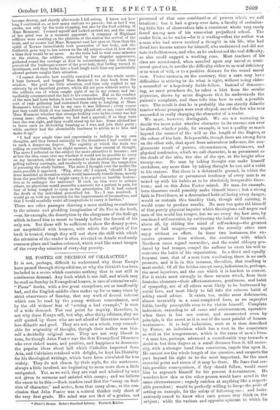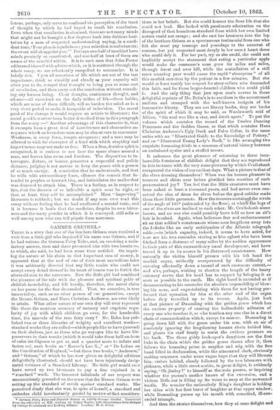MR. FOSTER ON DECISION OF CHARACTER.*
Iv is not, perhaps, difficult to understand why these Essays have passed through thirty editions, or why the thirtieth has been included in a series which contains nothing that is not still in continuous demand. Any book which is not dull, and which may be read on Sunday in Evangelical houses, is sure of extensive sale. "Pions" books, with a few great exceptions, are so insufferably bad, and the English middle class makes up for so many vices by strict observance of Sunday, that any work of decent interest which can be read by the young without concealment, and by the old without fear of "setting a bad example," is sure of a wide demand. The real point for inquiry, therefore, is, not why these Essays sell, but why, after thirty editions, they are still quoted by those who are not afraid of literature somewhat less didactic and good. They are not, as a whole, very remark- able for originality of thought, though their author was him- self a decidedly original man. They are not very liberal in tone, for though John Foster was the first Evangelical Dissenter who ever risked name, and position, and happiness to denounce the popular ideas about hell which Catholics imported from Asia, and Calvinists retained with delight, he kept his liberality for his theological writings, which have been circulated far less widely. They do not charm by their style, for the sentences, always a little involved, are beginning to seem more than a little antiquated. Yet, as we said, they are read and admired by men not given to sermons and satiated with essays; and we believe the cause to be this :—Such readers read first the "essay on deci- sion of character," and arrive, from that essay alone, at the con- clusion that John Foster was a natural thinker only short of the very first grade. His mind was not that of a genius, not • Foster's Essays. Bohn's Standard Library. Thirtieth Edition. possessed of that rare combination of powers which we call intuition ; but it had a grasp over data, a faculty of assimilat- ing little bits of observation into a consistent whole very rarely found annug men of his somewhat prejudiced school. The reader feels, as lie wades—for it is wading—that the author was a man who had never received a thought in his life, who had dived into human nature for himself, who understood and did not hate its feeblenesses, and who, as he understood the real difficulty, so also could suggest a working cure. Most teachers of his class are accustomed, when assailed upon any moral or semi- moral question, to ascribe the difficulty either to mental deficiency or to want of will, or to a positive distaste for the sound moral view. Foster assumes, on the contrary, that a man may have difficulties in striving to do what is right, without being either a scoundrel or a hopelessly feeble fellow. Instead of denounc- ing, as most preachers do, he takes a hint from the secular physician, shows by acute diagnosis tint he understands the patient's complaint, and then tells him how to seek a possible cure. The result is that he is probably the one strictly didactic teacher whose precepts were ever obeyed, one of the few who ever succeeded in really changing the character of a reader.
We must, however, distinguish. We are nit venturing to decide the moot point whether character in its essence can ever be altered, whether pride, for example, is not a quality as much beyond the control of the will as the length of the fingers, or the colour of the hair. It is possible, though there are strong facts on the other side, that apart from miraculous influence, the con- glomerate result of powers, circumstances, inheritances, and physical tendencies, which we call character, is as permanent as the shade of the skin, the size of the eye, or the height after twenty-one. No man by taking thought can make himself credulous, any more than by taking thought ho can add a cubit to his stature. But there is a debateable ground, in which the essential character or permanent tendency of every man is so mixed up with his habits as to be absolutely inseparable there- from ; and on this John Foster seized. No man, for example, born timorous could possibly make himself brave ; but a strong faith in Providence, or a determined habit of facing every danger, would so restrain this timidity that, though still existing, it would cease to produce results. No man can quite rid himself of that purely physical impulse which theologians call anger and men of the world hot temper, but we see every day how men, by continued self-restraint, by cultivating the habit of fairness, and, above all, by ridding the mind of self-seeking—the greatest cause of bad temper,—can acquire the serenity other men enjoy without an effort. In these two instances, the ex- cessive pressure from without, the contempt with which Northern races regard cowardice, and the social obloquy pro- duced by bad temper, compel the sufferer to exert his will to overcome the habit of his organization. In a third and equally frequent case, that of a man born vacillating, there is no such pressure, and it is, in this instance, therefore, that teaching is most useful. Of all the foibles except envy, indecision is, perhaps, the most injurious, and the ono which it is hardest to correct. For it exists most strongly in those natures which, from their feminine elements—their affectionateness, gentleness, and habit of sympathy, are of all others most likely to be buttressed by social love, and most likely to fall into the ruinous habit .of
asking small advice. It exists, too, unlike most deficiencies, almost invariably in a semi-completed form, as an imperfect foible, hardly perceptible even to its victim himself. Complete indecision, extending to all cases and circumstances, operative when there is but one course, and uncorrected even by principle, is the rarest as it is one of the most painful of human weaknesses. It is half indecision, such as is thus described by Foster, an indecision which has a root in the conscience as well as the temperament, which is the curse of men's lives. "A man has, perhaps, advanced a considerable way towards a decision, but then lingers at a small distance from it, till neces- sity, with a stronger hand than conviction, impels him upon it. He cannot see the whole length of the question, and suspects the part beyond his sight to be the most important, for the most essential point and stress of it may be there. He fears that cer- tain possible consequences, if they should follow, would cause him to reproach himself for his present determination. He
wonders how this or the other person would have acted in the same circumstances ; eagerly catches at anything like a respect-
able precedent ; would be perfectly willing to forego the pride of setting an example, for the safety of following one ; and looks anxiously round to know what each person may think on the subject; while the various and opposite opinions to which he
listens, perhaps, only serve to confound his perception of•the track of thought by which ho had hoped to reach his conclusion. Even when that conclusion is obtained, there are not many minds that might not be brought a few degrees back into dubious hesi- tation by a man of respected understanding saying, in a confi- dent tone,' Your plan is injudicious ; your selection is unfortunate; the event will disappoint you." Perhaps one-half of mankind have minds precisely so constituted, and one-half at least of them are aware of the mischief within. It is to such men that John Foster addressed himself with advice which, as it is scattered through the whole essay, we are reluctantly compelled to summarize. It is briefly this. Upon all occasions of life which are not of the last importance, think as steadily and clearly as your capacity will allow you to do, compel that thought to bring you to some sort of conclusion, and then carry out the conclusion without consult- ing any human being. Clear thought, continuous thought, and silence—all exercised on the daily trifles of life—these habits, Which are none of them difficult, will so harden the mind as in a very short period to make it incapable of indee;sion. The moral good of the change it would require an article to illustrate ; the social good has never been better described than in this paragraph from the essay :—" Auother advantage of this character is, that it exempts from a great deal of interference and obstructive an- noyance which an irresolute man may be almost sure to encounter Weakness, in every form, tempts arrogance ; and a man may be allowed to wish for character of a kind with which stupidity and impertinence may not make so free. When a firm, decisive spirit is recognized, it is curious to see how the space clears around a man, and leaves him room and freedom. The disposition to in- terrogate, dictate, or banter, preserves a respectful and politic distance, judging it not unwise to keep the peace with a person of so much energy. A conviction that he understands, and that he wills with extraordinary force, silences the conceit that in- tended to perplex or instruct him, and intimidates the malice that was disposed to attack him. There is a feeling, as in respect to fate, that the decrees of so inflexible a spirit must be right, or that, at least, they still be accomplished." Most " improving" literature is rubbish ; but we doubt if any man ever read this essay without feeling that he had swallowed a mental tonic, and it is because it heals that the medicine, despite its own bitter- ness and the nasty powder in which it is conveyed, still sells so well among men who can tell physic from nostrums.































 Previous page
Previous page